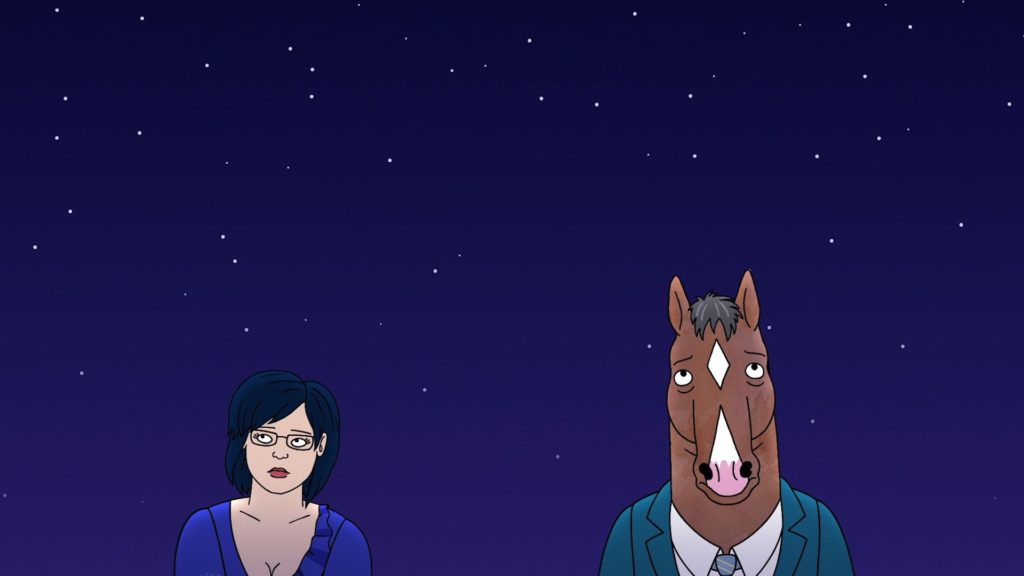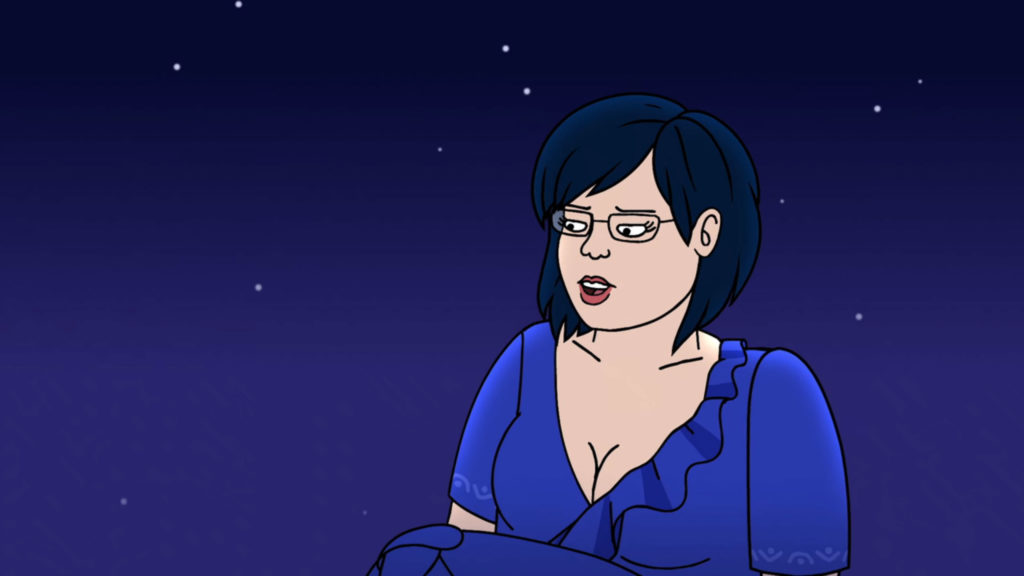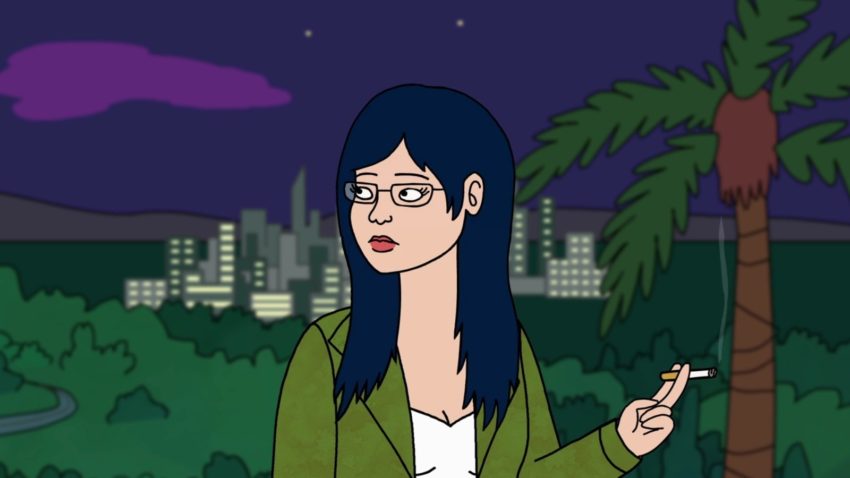WARNING: This article contains spoilers for BoJack Horseman.
It’s 4 am. After an unsuccessful attempt to fall asleep, which included, among others, watching videos of Tom Hardy reading children’s bedtime stories, here I am, in the kitchen, gobbling up a chocolate croissant and drinking cold coconut milk.
The feeling of heavy-heartedness prevails tonight. It’s an awfully quiet night, like most nights ever since the imposed quarantine measures, but a beautiful one nevertheless. There’s a certain magic about spring evenings that I cannot explain. Going back to having the blues – lately I’ve been noticing sudden mood swings that make me feel happy and full of energy the one day, and feeling a bit of sadness coupled with hopelessness the other day. Mild cyclothymia is no stranger to me, being the stupid Cancer that I am, but I’ve rationalised these recent ups and downs into the effects of being locked up in an apartment most of the time. Ah, this too shall pass, I figure.
But tonight is special. The low mood derived, maybe partly, by the fact that I finished watching one of my favourite series – BoJack Horseman. It’s an animated series, a Netflix original in fact, that began in my mind as a casual watch over dinner – you know, those twenty-minute-per-episode series you commit to, in order to accompany you over pizza. Little did I know that BoJack would have such an effect on my psyche – it’s sheer rawness, utter darkness, with glimpses of smart and sarcastic jokes and a ton of pop references captured me around Season 2 and there was no going back after that.

I suppose what picked my brain was how brilliantly this series managed to address radical issues and prominent taboos such as asexuality, mental health, abortion, feminism, trauma, alcoholism, and so on, in an intelligent and whimsical way, never underestimating its viewers. Its characters, each with their own flaws, were depicted as complicated and multi-dimensional in such a way that I have never seen before. These, coupled with amazing animation and spectacular music, made me establish a genuine connection with the series.
BoJack, man. What an experience. From references of Judith Butler’s Gender Trouble to establishing a complicated approach to issues that are far from simple, this show gave spaces to multiple voices while simultaneously acknowledging its own limitations.
In all its glory, there was one particular character who struck out in the series, and that’s no other than Diane Nguyen (a Vietnamese-American woman in her thirties, voiced by Alison Brie). Aaron Paul, the actor behind Todd, characterised Diane as “the anchor of this show” in an emotional farewell to the series on an Instagram post. Her brilliantness, concealed behind a profound darkness and low self-esteem, her insecurities derived from trauma, her unapologetic stance to feminism and her countless flaws beautifully constitute this complicated individual. Perhaps one of the reasons she captured my attention was how her character does not resemble the standard female characters on screen, and how relatable she is to a lot of women out there, including myself. She is, in all her wholeness, a human; she just happens to be an animated human in a TV show.
Most often than not, and especially the last few years, we get to see glimpses of female characters that steer away from the long-standing traditional depiction of women in films and series, one which places women at the centre of the male gaze. The sexually objectified representation of women in the media, viewed from the eyes of a white, middle-class, heterosexual man, has undergone a noticeable shift. Fearless women, empowered women, superhero women, success-story women, sexy women, unapologetic women who can and will have it all, is the new normal. The change is a welcomed one of course; it suggests that the limitations imposed on women as to what they are capable of, are just an illusion. Whatever you can do, we can do it as well. However, I’ve been thinking time and time again that it’s not always easy for real people who identify as women to rise up to these standards. I don’t have a perfect body, there are days I feel weak and lack the willpower to do anything productive, and I still haven’t figured out who I am – for whatever that means.
As empowering as these characters are, they fail to realistically resonate to average women – and even more so to women who do not identify as white, straight, and middle-class. The tendency to refer to “women” as if this is a homogeneous group is a myth that I debunked long ago, but let’s just refer to the term for the sake of discussion.
For those of us who feel kind of distanced from the standard “yass queen” mentality, Diane was a breath of fresh air in an otherwise boring scene of television series that does not explore female characters in the depth they deserve. Essentially, her character shows that women can also be introvert, socially awkward, overthinkers, with insecurities and so many flaws, and those women also have the right to have their story told, to be included.
Diane addressed our most profound fears. Two of the most emotional episodes was S6Ep3 “Brrap Brrap Pew Pew” when the show tackled the controversial subject of abortion through Diane, and S6Ep7 “The Face of Depression” when we got a glimpse of her dealing with depression.

Tackling abortion was no easy quest for the show. The episode, as a whole, was radical, sarcastic, playful, shameless, but above all, a political act, one that acknowledges that its viewers will approach the content with critical thinking and will see beyond the superficially grotesque representation of abortion. It deals with what it means for a woman to have an abortion in reality as we go through the abortion process through Diane’s eyes.
A particularly daring element in the episode is Serafina Aquafina’s videoclip “Get Dat Fetus Kill Dat Fetus”, whose ‘positive’ stance to abortion rejects all the inherent shame that comes with it. What it successfully managed to get across is not the message that abortion should be something to be celebrated per se (some viewers might be prone to think that way perhaps), but the fact that it takes away the shame and tragedy that goes hand-in-hand with having an abortion, and turns it into something to be taken lightly. That, on its own, is an act of rebellion. Despite all its wackiness and absurdity surrounding Serafina’s videoclip, the song foregrounds a different perspective on abortion, one that, in all its vulgarity, frees women from the shame and embarrassment linked to the act. The culmination of irony comes during an MSNBSea segment, when anchor Tom Jumbo-Grumbo assembles a “diverse panel of white men in bow ties to talk about abortion”, essentially reflecting the reality of white men having control over women’s bodies in the US and elsewhere in the world.

Even the episode title, which sounds like gibberish, indicates the juxtaposition between a severe issue and the episode’s seemingly light-hearted approach to it. The ability to joke about abortion is an act of subversion on its own. Making the radical decision to joke about abortion liberates women from the notion of the act being inherently heart-breaking and tragic, filled with guilt. At the end, the choice of presenting two women’s abortion stories (although Serafina was never pregnant to begin with), makes the valid point that each woman’s abortion experience is, by and large, different, and that different narratives exist.
While choosing to focus on the abortion episode first, the character of Diane deals with other issues as well, one of them being depression. In the episode “Good Damage” (S6E10), we get to experience Diane’s depression while struggling to write her memoir. As Diane works through getting out of the writer’s block, believing that anti-depressants took away her ability to focus, and thus, to make substantial progress with the book she wants to write, we become witnesses of her mental upheaval through a wonderfully animated segment that visualises what it means to have depression. Diane is mostly worried that she is not able to express her feelings, and she believes that by doing so, she will discard the pain of her abuse. Her memoir book, in her mind, will be her own personal redemption, and she fears that by not being able to write it, she will forever remain stigmatised and unable to steer away from what hurts her. Ultimately though, as a random act of observing other women in the mall where she goes to write, she ends up writing a quirky children’s novel about the adventures of Ivy Tran, Food Court Detective. At first, she is not happy about that; after all, she had other things in mind when she started her writing process. How will a seemingly superficial novel make an impact to girls going through what she had experienced in her life?
The conflict presented is a familiar one. The need to make a substantial difference in the world, and the inability to find the right way to make this a reality, has been a central one in my life. Indeed, there are many people I know that go through the same struggle. This is precisely why Diane’s depiction is important; it articulates and validates the struggle, while acknowledging that things do not always turn out as you initially planned. Indeed, Diane is a fierce activist, evident in her fight against fracking (and her willingness to go against her husband who is politically involved in favour of it), her feminist stance throughout the whole series, illustrated by how she challenges Hank Hippopopalous, a popular actor who has victimised women in his career, on live TV, and her decision to confront a big corporation while realising that she might get killed for it.

Despite her inherent need to make her voice heard about things that matter, she fails to comprehend how a seemingly cheerful children’s book can make a difference: “That means that all the damage I got isn’t ‘good damage.’ It’s just damage,” she frets. “I could have been happy this whole time and written books about girl detectives and been cheerful and popular had good parents… What was it all for?!”.
Crucially, it is Princess Carolyn (voiced by Amy Sedaris) who helps Diane realise that she sabotages her own happiness and potential using her trauma as an excuse. Diane expresses how her failure to write her memoir condemns the potential of reaching to people like her: “When I was a little girl, I thought everything, the abuse and the neglect, it somehow made me special. And I decided one day I would write something that made little girls like me feel less alone”. Princess Carolyn offers an alternative narrative, one in which Diane can reach out and make a difference to women like her through different ways: “I like thinking that my daughter could grow up in a world with books like that…. Maybe this book does that too”.
The portrayal of two entirely different women supporting each other in their own way is something that I particularly appreciated in BoJack Horseman, more so by the fact that the show, towards the end, make it more about these two women than the anti-hero that it was supposed to be about. Diane Nguyen started as constantly being in the shadow of BoJack, either by ghost-writing his own biography or by helping him throughout his mostly failed attempts to quit drinking and redefine his life. The emotional burden he puts on Diane culminates as she expresses the guilt she felt from not being close to him when he almost died and thus being unable to help him, in the last episode (“Nice While It Lasted”). At the end, we see a Diane who realises that it is unfair for her to try and solve all of BoJack’s problems and who grows as a person the moment she starts working on prioritising herself and her mental health above anything and everyone else.

By the end of the series, Diane achieves happiness on her own terms and she finds peace in living with her new husband, Guy, in Houston, and writing quirky children’s books. This is the series’ own happy ending to a wonderful character, the most incredible character of the show in my opinion, an ending which she deserved. This is perhaps why I loved the show so much; it steered away from making BoJack the sole protagonist of the series and drew the attention on complicated women such as Diane. Her growth ultimately indicates how depression and toxic people constrain us, and the need to forgive ourselves if we want to move on.
While the end credits of the final episode of BoJack Horseman rolled on the TV in the living room, I felt a genuine sadness; despite a wonderful experience coming to an end, I will forever hold Diane Nguyen in my heart and remember the show as being able to touch my soul.
a.

